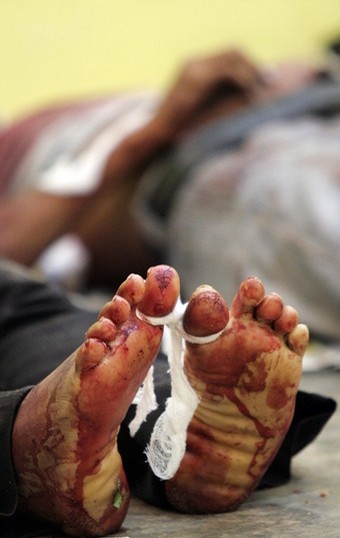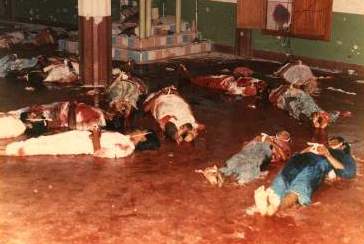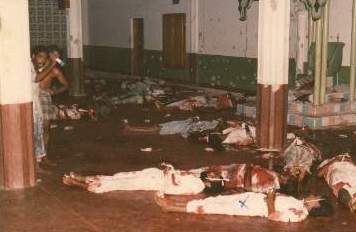Ethnic Cleansing and the Moral
Perspective of Sri Lankan Tamils
Secretariat for Coordinating
the Peace Process (SCOPP)
16th April 2008

Attending the recent conference on Peace and Reconciliation in South
Asia, arranged by the International Association for Human Values, proved
a fascinating experience. In the first place it was held in Oslo, and
I was able to meet many of those associated with the peace process on
their home ground: not only Eric Solheim and Jon Hanson Bauer and their
staff, but also the Head of the Asia Desk of the Foreign Ministry and
her assistant who is concerned with Sri Lanka.
Then I made the acquaintance of many of the Sri Lankan Tamil diaspora,
and was able to engage with them actively. There was the graduate from
Peradeniya who was related to one of the dons there who had been a frequent
companion there at the Faculty Club; there was the priest with a superb
Catholic name who suddenly started talking of his marriage, and was
also a passionate advocate of divorce - which he used as a metaphor
for separatism, being married himself, having changed denominations,
to a Sinhalese lady as he proudly put it; there was the mysterious Mr
Sivapalan whom I had tried to trace through the SLMM, since he had been
the LTTE local monitor for the Trincomalee District, and who turned
out to be a charming soft-spoken lawyer, now settled in Ireland. There
was a poet, and a former Communist who admitted now to being part of
the LTTE, and a member of the ill-fated Sub-Committee on Immediate Humanitarian
and Rehabilitation needs in the North and East and a member of the LTTE
negotiation team.

LTTE's Kattankudi Muslim Mosque Massacre (03
August 1990) Tamil Tiger terrorists swooped on Muslim prayers inside
the holy KATTANKUDY mosque and butchered 103 Muslim prayers including
over 25 small children.
Though in plenary sessions most of them - though not the lawyer - were
vociferous, in private discussions they were amiable and willing to
engage in discussion and debate. Some of the younger participants, whose
names I did not get, and who did not stay for the whole conference,
were rude in private too, but it occurred to me that this was a very
significant difference. They had probably not interacted at all with
Sinhalese in the ordinary course of things, and had an image of steadfast
enmity, fed on recollections of the horrors of the early eighties. The
older men however - there were very few women present, and most of them
hardly spoke - remembered days of racial amity, and understood that
active engagement was possible.
As far as they were concerned, I felt immensely sorry, for I realized
that the bitterness that governed what seemed public intransigence was
a product of the deep sense of hurt they felt after the attacks on Tamils
they had experienced in their formative years, in 1977 and 1981 and
1983. Though they realized, many of them, that these had not been repeated,
that they were solely the responsibility of some elements in a particular
government at a particular time, the experience had been traumatic and
one had to sympathize with their continuing agony.
And in one respect at least they had a concern for Sri Lanka as a living
entity, which distinguished them sharply from Mr. Vaiko, the South Indian
politician who has turned the LTTE into his own particular cause, to
the continuing irritation and perhaps worry too of the Indian government.
I was not sure why the organizers of a Conference on Reconciliation
had invited him, for in his case the bitterness was intense.

LTTE's Kattankudi Muslim Mosque Massacre (03
August 1990) Tamil Tiger terrorists swooped on Muslim prayers inside
the holy KATTANKUDY mosque and butchered 103 Muslim prayers including
over 25 small children.
Though polite in private, and willing to talk pleasantly enough with
the Sri Lankan delegates, he had a myopic view of history and was quite
unable to set things in context.
The distinction became clear when a Muslim member of the diaspora,
who was not at all unsympathetic to his Tamil colleagues, mentioned
the ethnic cleansing of Muslims that the LTTE had engaged in way back
in 1990.
To a man the Sri Lankan Tamils registered that that had been wrong.
Some of them described it as an action of the LTTE alone, indicating
that they did not see this as an intrinsic aspect of the Tamil cause.
The others, more committed to the LTTE, asserted that the LTTE had apologized
for this error - which is in fact the case - and had even resettled
the bulk of Muslims, which is not the case, but indicated their own
awareness of the enormity of the mistake.
Not so Mr. Vaiko. He claimed that, while some Muslims might have been
expelled in error, the action had been taken to clear the peninsula
of those who had collaborated with the Sinhala government. These were
traitors, he insisted, and expelling them had been necessary, and they
would certainly not be allowed back.
It was an outrageous statement, but I suppose understandable in a man
who really knows nothing about the Sri Lankan situation. This was a
typical example of what Barack Obama has described as 'othering', one
of the prime reasons for the Sri Lankan problem, the sense that one
has no relationship with people seen solely in terms of their otherness.
This was not the position of the Sri Lankan Tamils there, and I felt
proud of them. It struck me then that, however diverse our positions
seemed to be, there was room for reconciliation with them, for they
still saw themselves as Sri Lankans, and realized that there were other
Sri Lankans to whom they were connected, whatever differences might
have arisen. If we can move to a political solution that will make up
for what they suffered in the early eighties, I have no doubt that,
in time, they will give up separatism, and dissociate themselves from
the terrorism that has now become an essential part of the separatist
movement.
Far away in Norway, or wherever they have settled, they are not aware
of the changes that have taken place, more rapidly under this government
than any other, to affirm the pluralistic and democratic nature of Sri
Lanka.
Whilst making clear that separatist terrorism will not succeed, we
need to move more quickly on positive measures, to engage more with
the diaspora, draw them in to the development that the East and the
North so desperately need. Some elements in the LTTE may remain intransigent,
and take an outsider like Mr. Vaiko with them. For the others, I feel,
their recognition of a distinct Sri Lankan identity may serve to integrate
them once more into a pluralistic national polity.

Prof. Rajiva Wijesinha
Secretary General
Secretariat for Coordinating the Peace Process
|



